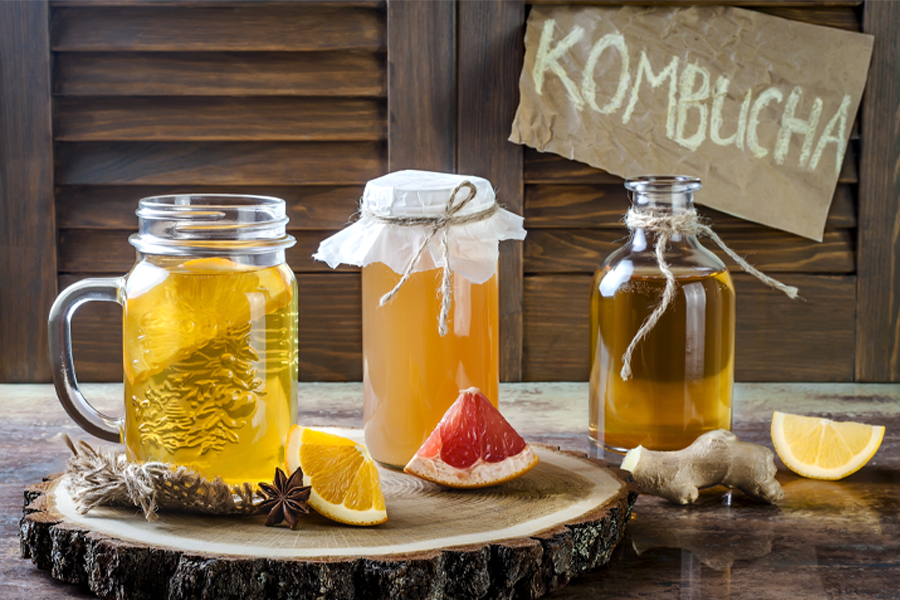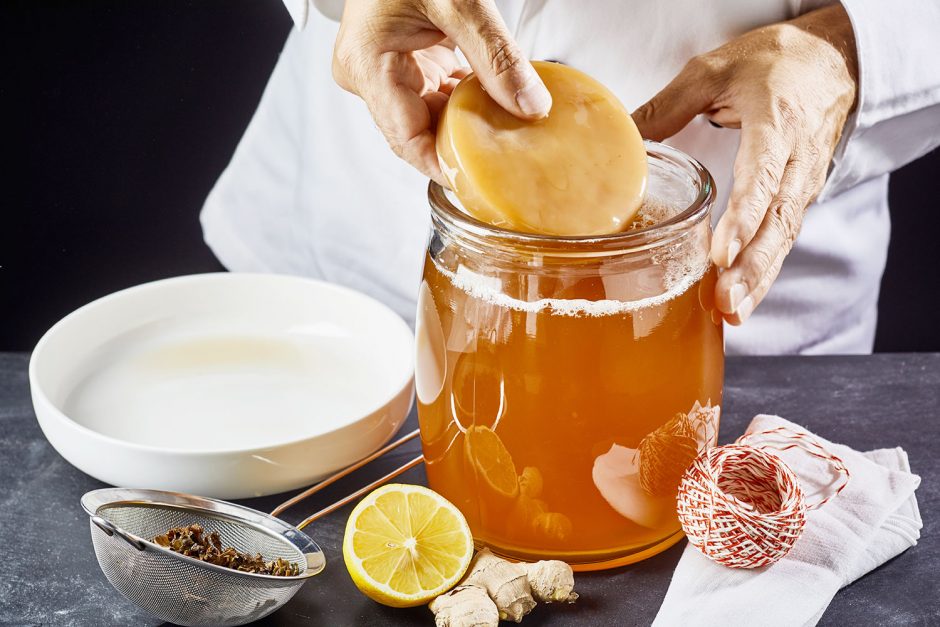May Help Boost Metabolism
If youre looking to drop a few extra pounds, youll likely consider anything thatll jump-start your metabolism.
Kombucha isnt a miracle weight loss drink. But thanks to the epigallocatechin-3-gallate found in the green tea of some types of kombucha, it may be a secret to a slightly faster metabolism.
EGCG is a catechin, a compound found in green tea. According to a review published in May 2017 in the Journal of Nutritional Biochemistry, catechins have the potential to boost metabolic rates in adults. But existing studies on the topic are short and small, and the authors of the review note that more research is needed to know the true effects of EGCG on metabolism.
Can Kombucha Ever Be Bad For You
According to the CDC, it’s safe to consume four ounces of kombucha three times per day. The safety of drinking more than this is unknown.
If you’re new to drinking kombucha, you may want to start slow since the low pH of this beverage might contribute to some GI distress.
In addition, since kombucha is not pasteurized, some people should avoid drinking kombucha altogether, such as those who are higher risk for foodborne illness, including:
- Women who are pregnant
- People with a weakened immune system
Pregnant women still considering drinking kombucha should also be aware that it contains both alcohol and caffeine .
Lastly, be cautious about home-brewed kombucha especially if the brewer is new to fermentation. Inadequate sanitation of brewing equipment can lead to contamination with harmful bacteria, and fermenting in improper vessels, such as clay jars, can lead to harmful compounds leaching into the beverage.
Who Should Not Drink Kombucha
Although rare, there have been reported cases of severe allergic reactions, acidosis and liver complications due to potentially contaminated kombucha consumption . Since kombucha is unpasteurized and contains small amounts of caffeine and alcohol, pregnant and breastfeeding women should avoid it as well .
Read Also: Why Does Twisted Tea Have Words On The Caps
Kombucha May Help Prevent Cancer
There is growing evidence that kombucha may help in the prevention of certain types of cancer. The black or green tea used in kombucha contains catechins, a type of phenolic compound that has antioxidant properties. The phenolic compounds, especially epigallocatechin-3-gallate found in black and green tea are thought to have potential anticancer properties. Green tea has higher concentration levels of ECGC than black tea and is thought to play a more important role in the prevention of cancer.
In animal studies, catechins have shown to hinder tumor cell growth, remove toxins from the body and possibly protect against damage from ultraviolet B radiation. It is thought this may help reduce the risk of prostate, stomach, colon, breast and lung cancers.
Two small case-control studies conducted in southeast China and Japan also found that ten or more cups of green tea per day produced a small reduction in the risk of prostate cancer in men.
Kombucha brewed with green tea may possess some of the same benefits of green tea on its own, but this needs to be investigated further to confirm.
Is Kombucha Safe For Everyone

Kombucha is classified as a functional food because of its potentially beneficial effect, when enjoyed as part of a varied and balanced diet however, it may not be suitable for all people and there may be some risks.
Kombucha is not advised for pregnant or breastfeeding women, or those who have a compromised immune system. It is important to reiterate that there havent been many human clinical studies to prove its safety and efficacy. There have been some reports that drinking too much can lead to unpleasant side effects, such as stomach ache, nausea and dizziness. Prolonged fermentation is not recommended because of the accumulation of organic acids, which might reach harmful levels.
Fermented foods, including kombucha, are high in histamine, so those with a histamine intolerance should be wary that consuming kombucha may exacerbate symptoms.
Always check with your GP if you are concerned about introducing kombucha to your diet, or if you have any adverse side effects after consuming it.
You May Like: Can I Drink Tea With Invisalign
Best Tea For Making Kombucha
Black Tea: Tea leaves that have been oxidized for a long time , creating a strong flavor. Common types of black tea that work well in kombucha include Ceylon and English Breakfast . When growing a SCOBY, only use black tea. Once your SCOBY has been through 4 or 5 batches, you can begin introducing other teas.
Green Tea: Tea leaves that have been minimally oxidized, creating a mild earthy flavor. Use green tea in combination with another tea or on its own.
Oolong Tea: Tea leaves that have been partially oxidized , creating a mild grassy to fruity flavor. Use oolong tea in combination with another tea or on its own.
White Tea: While black, green, and oolong teas are made from mature tea leaves, white tea is made from the young leaves and is minimally oxidized. This creates a delicate flavor and light color. Use white tea in combination with black, green, or oolong tea
SomeHerbal Teas: Herbal tea is a catch-all term that includes any tea not made from tea plant leaves. Herbal teas can be made from herbs, spices, or plants. While most herbal teas are not suitable for fermentation, there are a few that are suited for kombucha:
May Help Strengthen The Immune System
The gut-healthy benefits of kombucha may also provide an immune system boost.
It’s important to note that the digestive system and immune system are closely intertwined the lining of the intestines creates antibodies that help protect the body, according to John Hopkins Medicine. A huge portion of the immune system is found in the gut, more specifically about 70 percent, according to a study.
Thus, Zenhausern explains, optimal gut health is the key to a strong immune system. The fermenting bacteria in kombucha can boost immunity, thanks to the dose of good bacteria they provide, says Zenhausern.
Read Also: Where To Buy Sleepytime Tea
Kombucha Can Have A Lot Of Sugar
Gans says its important to acknowledge that kombucha is fermented with sugar, making it not the best beverage to select if you are watching your sugar intake. Excess sugar inside some kombucha brands can lead to extra consumption of calories.
To avoid eating too much sugar, Gans recommends selecting kombucha brands like KeVita, as it uses stevia to help keep overall sugar levels down.
Kombucha May Reduce Heart Disease Risk
Heart disease is the worlds leading cause of death .
Rat studies show that kombucha can greatly improve two markers of heart disease, bad LDL and good HDL cholesterol, in as few as 30 days (
30 ).
Summary Kombucha has been shown to improve bad LDL and good HDL cholesterol levels in rats. It may also protect against heart disease.
Recommended Reading: How Much Sugar In Twisted Tea Light
Can The Antioxidants In Kombucha Benefit Your Health
Antioxidants are compounds that can help protect your body from “free radical” damage damage that happens naturally over time, as well as a result of certain lifestyle behaviors.
Tea itself is known for its antioxidant and anti-inflammatory power, likely due to the polyphenols it contains. Observational studies have shown that people who regularly drink tea have a lower risk of heart disease and diabetes, although the exact mechanism by which tea contributes to these health outcomes is still largely unclear.
As a fermented tea drink, it stands to reason that kombucha might hold some of the same benefits we know to be true for unfermented tea. However, it’s important to note that tea’s known health benefits apply to those who drink several cups per day.
It’s not advised that people drink as much kombucha, given its sugar content. It’s unknown if, say, a single cup day would provide any health benefits.
How Much Kombucha Can You Drink In A Day
Not much research has been done on the subject, but consuming about 4 ounces daily may not cause any adverse effects in healthy people, according to the Centers for Disease Control. .
“However, the potential health risks are unknown for those with preexisting health problems or those who drink excessive quantities of the tea,” the CDC stated.
Pregnant woman and kids should steer clear of the beverage altogether, Gans says. Thanks to the fermentation process, kombucha can contain trace amounts of alcohol, usually ranging from 0.5% to 3% alcohol by volume.
You May Like: Does Green Tea Fat Burner Help You Lose Weight
Nutritional Information Of Kombucha Tea
You guessed it right! It is the nutritional and biochemical composition of kombucha tea that is responsible for the multitasking. Lets take a brief look at it:
| Nutrition Facts Serving Size 100g |
|---|
| Amount Per Serving |
It is evident that this has almost no saturated fat and cholesterol.
Also, kombucha tea contains trace elements and vitamins like B12, B6, and folate.
Now you know what to drink on those hot summer days or when you have a bad tummy ache!
Also, wouldnt it be nice if you were able to give this tea a personal touch?
Of course, it would! So, here are some quick and quirky recipes for making the kombucha tea at your home and all by yourself.
Kombucha May Help Strengthen The Immune System

The health of your immune system is linked with the health of your GI system. Probiotics play a big part in maintaining a healthy gut and this in turn may strengthen the immune system’s response to inflammation and infection. The bacteria, B and C vitamins, and minerals such as iron, zinc and copper that are produced in the fermentation process play a role in keeping the immune system healthy too.
Continued studies into kombucha’s health claim in boosting the immune system are needed.
You May Like: What Is In Sleepy Time Tea
Kombucha Is Considered Safe For Most People But Even That’s Up For Debate
Notably, how much kombucha someone can safely drink is also a gray area. In 1995, the Centers for Disease Control and Prevention recommended drinking no more than four ounces per day, based on the fact that two healthy women who regularly drank homemade kombucha fell unexplainably ill . But, kombucha was never proven to be the cause of these deaths. Cases like this are incredibly rare despite the fact that most people drink more than four ounces of kombucha at a time, so unless you’re consuming an ungodly amount of the stuff, you probably don’t need to worry about toxicity.
Of course, you should keep in mind that kombucha might contain more alcohol than you think. Although small amounts of alcohol are created as part of the fermentation process, kombucha isn’t classified as alcohol because it typically has less than 0.5 percent ABV, the cutoff point. That said, lots of random sampling studies over the years, including this one conducted by the British Columbia Centre for Disease Control in 2020, have found that many bottle contain between one and three percent alcohol.
Because of the alcohol and the live bacteria, it’s recommended that pregnant women and immunocompromised individuals stay away from kombucha. And, not for nothing, the carbonation and other ingredients in kombucha can also lead to stomach discomfort.
Where To Get Kombucha
Dont want a jar of fermenting tea sitting on your counter perpetually? Youre in luck.
Kombucha has gained popularity in the US recently and is now available in many stores. There are dozens of really good brands and if you choose to buy it, just look for an organic variety without a large amount of sugar or added ingredients. Some of my favorite pre-made brands are:
You May Like: Fundamentalist Church Of Latter Day Saints
Side Effects Of Too Much Kombucha
Kombucha is a popular fermented tea drink with many impressive health benefits.
For example, its a rich source of probiotics and antioxidants .
Plus, it has antimicrobial qualities and has been shown to reduce heart disease risk factors and blood sugar levels (
But although kombucha is good for you, its possible to drink too much.
Here are 5 possible side effects of drinking too much kombucha.
Dangerous For Certain People
While kombucha is safe for most people, it can cause severe side effects in some.
Because kombucha is unpasteurized and contains a mix of different types of bacteria and yeasts, it can promote the growth of opportunistic bacteria that can lead to infections in certain people.
For instance, those who have weakened immune systems, such as people with cancer, kidney disease or HIV, can develop serious complications from drinking kombucha .
Although rare, there have been reported cases of severe allergic reactions, acidosis and liver complications due to potentially contaminated kombucha consumption .
Since kombucha is unpasteurized and contains small amounts of caffeine and alcohol, pregnant and breastfeeding women should avoid it as well (
You May Like: Where To Buy Hibiscus Leaves For Tea
It May Protect Against Cancer
Of course, no studies have been done in humans on the protective nature of kombucha to help fight cancer, but there is some research that is encouraging.
For example, in test-tube studies, theyve found that kombucha helped prevent the growth of cancerous cells, probably because of its high polyphenol content .
Furthermore, kombucha is very high in Glucaric acid, and some studies have shown that glucaric acid helps prevent cancer .
Will it cure cancer? Not likely. Can it potentially help slow its growth and reduce its spread? Possibly. Its certainly an area that demands additional research.
Special Precautions & Warnings
Pregnancy and breast-feedingPOSSIBLY UNSAFE
Alcoholism: Kombucha tea contains alcohol. Avoid it if you have a drinking problem.
Diabetes: Kombucha tea might affect blood sugar levels in people with diabetes. Watch for signs of low blood sugar and monitor your blood sugar carefully if you have diabetes and use kombucha tea.
Diarrhea: Kombucha tea contains caffeine. The caffeine in kombucha tea, especially when taken in large amounts, can worsen diarrhea.
Irritable bowel syndrome : Kombucha tea contains caffeine. The caffeine in kombucha tea, especially when taken in large amounts, can worsen diarrhea and might worsen symptoms of IBS.
Surgery: Since kombucha tea seems to affect blood glucose levels, there is a concern that it might interfere with blood glucose control during and after surgery. Stop using kombucha tea at least 2 weeks before a scheduled surgery.
Weak immune system: Don’t use kombucha tea if you have a weakened immune system due to HIV/AIDS or other causes. Kombucha tea can support the growth of bacteria and fungus that can cause serious infections.
Read Also: Does Green Tea Help Lower Blood Pressure
Does Kombucha Really Have Health Benefits
The concoction of microorganisms in kombuchabacteria, yeasts, and antioxidantshave led some to speculate that it could boost your immunity, ward off cancer, and alleviate inflammation. Problem is, much of the research on kombucha has been conducted on animals, not humans, so no one knows for sure, according to the 2014 research published in the Comprehensive Reviews in Food Science and Food Safety. While there isnt a ton of research on the health benefits of kombucha, there are definitely some to consider.
Its Rich In Antioxidants

Kombucha is extraordinarily antioxidant rich, and you all know the benefits of anti-oxidants for boosting your immune system and energy levels. Antioxidants have also long been known for reducing the signs of aging .
Essentially, antioxidants are molecules that fight the free radicals in your body. Free radicals, while not inherently bad, do become dangerous to your health in large quantities . When your body starts to accumulate enough free radicals for a long enough period of time, it can cause oxidative stress.
Oxidative stress is currently thought to be the main cause of aging as well as age-related diseases such as cancer, diabetes, heart disease, kidney disease, and dementia .
Naturally, the number one way to reduce oxidative stress is to consume antioxidants, particularly from foods and beverages rather than supplements . That makes drinking kombucha a much healthier alternative to sodas when you need a fizzy drink fix.
Don’t Miss: How To Study For Ati Teas Test
How Do You Make Kombucha
Kombucha is usually made using:
- Black or green tea
- Scoby purchased online, or from an existing batch of kombucha
To make kombucha, the tea and sugar is steeped in boiled water and left to cool before adding the scoby. This is covered and left to ferment for up to a week. The mixture is then poured into an airtight container with some extra sugar and left for a few more days the longer it is left, the fizzier it will become. At this point, flavourings such as spices or fruit, can be added.
Kombucha Can Help Halt That Crazy Blood Sugar Roller Coaster
Frequent spikes and dips in blood sugar a result of eating refined carbs like doughnuts or pasta in the absence of fiber or protein can seriously eff with your mood and trigger sugar cravings, especially if you have type 2 diabetes.
Kombucha helps tame the blood sugar beast. One study on rats with diabetes found that kombucha helped slow the digestion of carbs, which lowered blood sugar. It also seemed to improve the function of the liver and kidneys two organs affected when blood sugar is out of whack.
One potential reason: Kombucha contains acetic acid, a byproduct of fermentation, which has been shown to successfully lower blood sugar and insulin levels.
Bonus points for kombucha made with green tea! The main catechin antioxidant in green tea epigallocatechin-3-gallate can influence the way glucose is absorbed by the body.
One research review found that green tea drinkers consuming 3 to 4 cups per day have an 18 percent lower risk of being diagnosed with type 2 diabetes.
Don’t Miss: What Tea Has No Caffeine